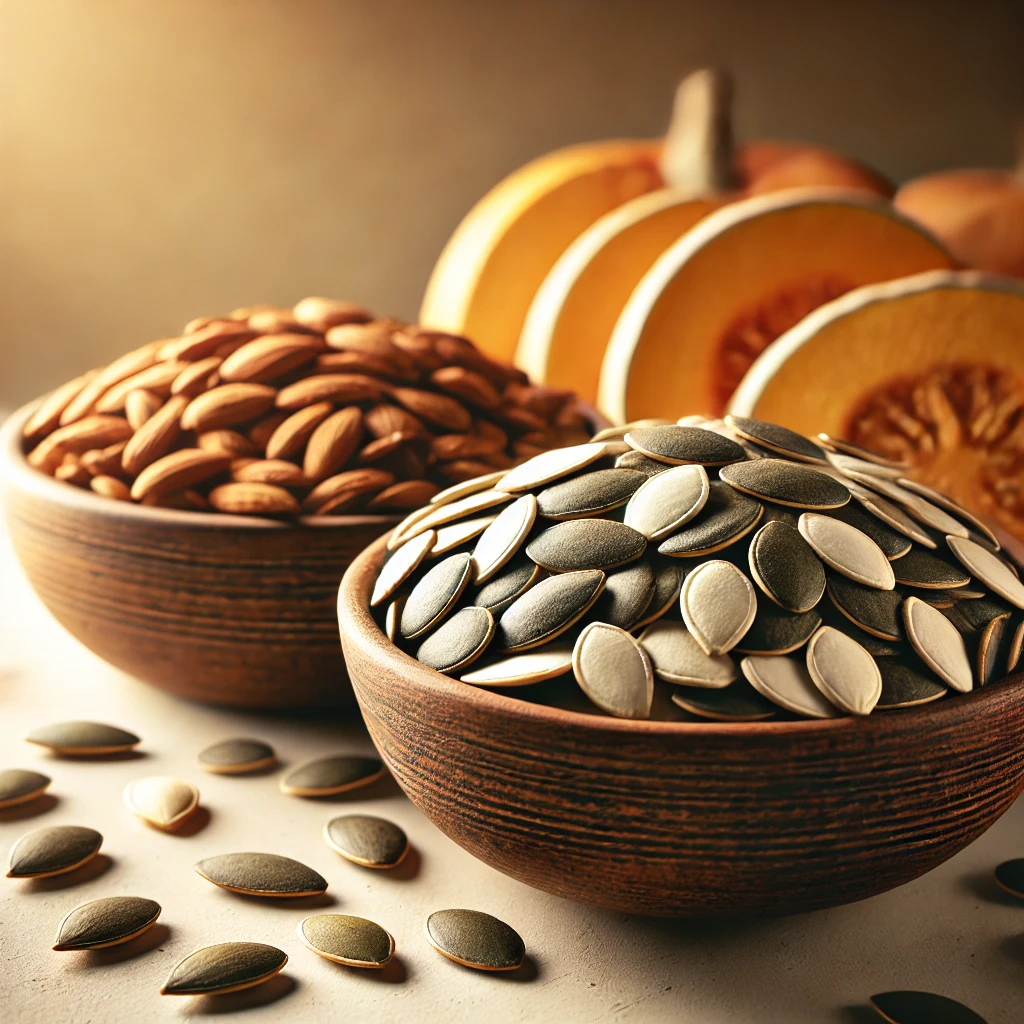Pumpkin seeds, also called pepitas, are a popular snack that packs a big nutritional punch. These small, flat, green seeds are full of healthy fats, protein, and essential nutrients, making them a great addition to any diet. You can eat pumpkin seeds either raw or roasted, and while both forms have their own benefits, there are some differences to consider when choosing between them.
In this article, we’ll take a closer look at the health benefits of pumpkin seeds, compare the differences between raw and roasted options, and provide tips on how to enjoy them as part of a healthy lifestyle.
Health Benefits of Pumpkin Seeds
Pumpkin seeds are known as a superfood because they are loaded with nutrients. They are a great source of healthy fats, particularly omega-3 and omega-6 fatty acids, which support heart health and brain function. These seeds are also rich in protein, making them a good option for people who want to increase their protein intake, especially those on a plant-based diet.
In addition to healthy fats and protein, pumpkin seeds are full of important minerals like:
- Magnesium: Supports heart health and helps with muscle and nerve function.
- Iron: Vital for carrying oxygen in the blood and supporting energy levels.
- Zinc: Helps with immune function and promotes healthy skin.
- Potassium: Helps regulate blood pressure and maintain proper hydration levels.
Pumpkin seeds are also high in antioxidants, which help fight inflammation in the body. These antioxidants can protect cells from damage, support heart health, and even reduce the risk of certain diseases.
Raw Pumpkin Seeds: Nutritional Powerhouse
Raw pumpkin seeds are the most natural form of this superfood. When eaten raw, pumpkin seeds retain all of their nutrients and are particularly rich in antioxidants and enzymes. Eating raw pumpkin seeds can help you take full advantage of their anti-inflammatory benefits, which can improve heart health and support the immune system.
Raw pumpkin seeds have a light, nutty flavor, and they can be added to smoothies, salads, or trail mixes. They are also great on their own as a crunchy, healthy snack. If you’re looking for a simple way to boost your intake of healthy fats, fiber, and protein, raw pumpkin seeds are a great choice.
One potential downside to raw pumpkin seeds is that some people may find the taste too bland compared to roasted seeds. Additionally, raw seeds are sometimes harder to digest for certain individuals. If you find this to be the case, soaking the seeds before eating them can help make them easier on the stomach.
Roasted Pumpkin Seeds: Enhanced Flavor, Slightly Fewer Nutrients
Roasting pumpkin seeds brings out a rich, toasty flavor that many people prefer over raw seeds. The roasting process also makes the seeds crunchier, which can make them more enjoyable as a snack.
However, roasting pumpkin seeds can reduce some of their antioxidant content. High temperatures can break down certain nutrients, particularly heat-sensitive antioxidants. For this reason, it’s a good idea to roast the seeds at a lower temperature (about 250°F or 120°C) for a longer time to minimize nutrient loss. Lightly roasting the seeds for 15 to 20 minutes should give you a nice balance of flavor and nutrition.
Even though roasted pumpkin seeds may lose a small amount of nutrients during cooking, they are still packed with essential vitamins, minerals, and healthy fats. They are also easier to digest for many people, especially if raw seeds are harder on your stomach.
Which Is Better: Raw or Roasted?
The choice between raw and roasted pumpkin seeds comes down to personal preference and what you’re looking to get from your food. If you want the most nutrients possible, raw pumpkin seeds are the way to go. They offer a higher concentration of antioxidants and enzymes that can benefit your health.
On the other hand, if you prefer a more intense flavor and crunch, roasted pumpkin seeds are a delicious option. While they may lose a small amount of their nutrients during roasting, they are still incredibly healthy and offer most of the same benefits as raw seeds.
Both raw and roasted pumpkin seeds are great sources of fiber, which is important for healthy digestion. Adding a handful of these seeds to your daily diet can help keep you feeling full, support gut health, and provide long-lasting energy.
How to Enjoy Pumpkin Seeds
There are many ways to enjoy pumpkin seeds, whether you prefer them raw or roasted. Here are a few ideas to incorporate them into your diet:
- As a snack: Eat them by the handful, either on their own or mixed with other nuts and seeds.
- In salads: Sprinkle them on top of salads for a crunchy texture.
- In smoothies: Add a spoonful of raw pumpkin seeds to your smoothie for a boost of healthy fats and protein.
- As a topping: Use them as a topping for yogurt, oatmeal, or smoothie bowls.
- In baking: Pumpkin seeds can be used in baked goods like bread, muffins, or granola bars.
Whether you choose raw or roasted, pumpkin seeds are a versatile and highly nutritious food that can easily fit into a healthy diet. They provide a good source of essential fats, protein, fiber, and a range of vitamins and minerals. If you want to maximize the nutrients you get, raw pumpkin seeds are a great option. But if you prefer a more robust flavor and crunch, lightly roasted seeds are still a nutritious and satisfying choice.
Source:
Share this content:



